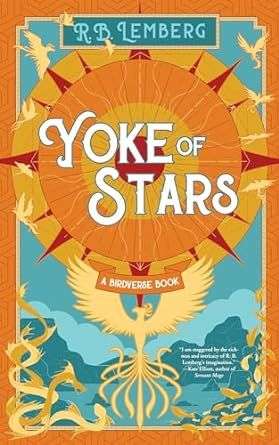
For all things fantasy, horror, and speculative fiction

Review Details
Review type: Book
Title: Yoke of Stars
Author: R.B. Lemberg
Publisher: Tachyon Publications

Reviewed by: Nadya Mercik
Other details: £14.99
Yoke of Stars by R.B. Lemberg
Book Review
Nadya Mercik
Yoke of Stars by R.B. Lemberg is a novella in the Birdsong universe, but it reads as a standalone. With its beautiful, evocative prose, it is an ode to languages, a dialogue about otherness and gender, and an uplifting story of overcoming, fighting, and finding support.
The story starts with the Bird and stars myth, which gives us a glimpse at how some of the people in that universe appeared and sets the path for understanding the yoke of stars. Brought by the Bird God, the stars were scattered around, and they had to tend to the souls within them. As R.B. Lemberg mentioned in the afterword, she drew some inspiration for the stars from the communist history of the USSR. As a result, the stars are a combination of ancient power and big fear; in some ways, they behave like political leaders, but they are also destinies and old ways.
Later, we find ourselves in the company of two people – Stone Orphan, an assassin who graduated from the School of Assassins, and UlÃn, her first client. Throughout the novella, the two of them sit in Orphan’s room in the school, share their complex stories and drink tea while UlÃn tries to decide who exactly she wants to be killed. With such a static decoration, the story is nothing but dynamic.
UlÃn had a very high position in society, but she had no freedom over her life. People have harmed her, her deepnames and magic have been taken away, and that’s what brought her to the School of Assassins. Yet among all those who hurt her, she cannot choose the one to be killed. Stone Orphan is of the Siltway people. She is different from UlÃn in many ways, beginning with her fish-like appearance and ending with her worldview, influenced by her native language, which has no verbs. Though always driven by curiosity and a call to explore, she is now bitter for having been exiled, for having to learn a different language, which seems to be erasing her personality by making her think differently. She craves to complete her first task and be out of school, so UlÃn’s indecision grates at her. And yet, the more Stone Orphan listens to UlÃn’s story, the more she feels compassion and bond, and the more of the bigger plan transpires.
At first glance, Stone Orphan and UlÃn are so different. While UlÃn adores languages and sees their beauty, learns them for the sole purpose of knowing them, Stone Orphan despises her new language and how it alters her. But on a deeper level, they are the same – they both suffered and were rejected, misunderstood and used. They were both bound by their designated roles and unseen for who they were. Their difference only highlights their similarities, and it is through that they can find a way out for both of them.
The narrative alternates between Stone Orphan and UlÃn; their stories abruptly cut as they have to deal with their emotions – so while one recuperates, the other continues. Listening to each other helps them understand themselves more and get a wider perspective. As I mentioned earlier, Yoke of Stars is a dialogue about otherness and gender. Stone Orphan’s language and society deny individuality to the point that it doesn’t matter whether you are male or female; they don’t have the language to designate trans or binary people. Stone Orphan’s old bond had to travel to another tribe to be able to associate themselves with a woman. UlÃn, on the other hand, comes from a more progressive society, where people can have multiple relationships, yet she still confronts limitations and criticism when she wants to choose her destiny.
As the book title suggests, the main characters must stand against something very authoritative and powerful – the yoke of stars, a symbol of society’s rigidity, narrowmindedness, and fear of otherness. Yet, even in a situation that looks like a stalemate, they manage to find some trust between themselves and find a way out.
From the style of prose to the vivid worldbuilding and the dramatic narrative, I loved everything about this novella. I loved how it shows us through language and action how it is an appeal and a comfort, a search and an understanding.
Tags: FantasyR. B. LembergTachyon Publishing
Category: Book Review
All reviews
Latest Reviews:
- Gifted and Talented by Olivie Blake
- The Human Chord by Algernon Blackwood
- The Fog by James Herbert
- A Palace Near The Wind by Ai Jiang
- Extremity by Nicholas Binge
- Girl Dinner by Olivie Blake
- The Swan’s Daughter by Roshani Chokshi
- Out of the Past, Tales of Haunting History edited by Aaron Worth
- Witchborne by Rachel Grosvenor
- Shattered Reality . Call of Cthulhu Scenario Anthology
Review tags:
Action (48) Adventure (69) Angry Robot Books (11) Contemporary Fantasy (16) Fantasy (117) Gothic Horror (12) Harper Voyager (12) Historical Fantasy (14) Hodderscape (11) Horror (73) Orbit Books (33) Romance (28) Science Fiction (35) Titan Books (36) TorDotCom (12)
Leave a Reply